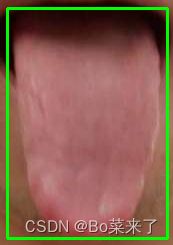简化YOLOv5的推理过程
模型为YOLOv5s(v7.0)
目录
基本流程:
一、导入库
二、完整代码
三、结果分析
总结
基本流程:
加载模型---动态resize图片大小---归一化---HWC转CHW---扩展维度---numpy转tensor---转float32---预测--NMS--将检测框缩放至原始图尺寸--你需要的功能(截图、画检测框等)
一、导入库
导入cv2和numpy、torch库,从general.py中导入non_max_suppression(NMS,用于去除重复框),scale_boxes(将检测框缩放至原图片上)。
import cv2
import numpy as np
import torch
from utils.general import non_max_suppression, scale_boxes
from utils.plots import save_one_box2 #自己写的,根据检测框保存截图二、完整代码
import cv2
import numpy as np
import torch
from utils.general import non_max_suppression, scale_boxes
from utils.plots import save_one_box2 #自己写的,根据检测框保存截图
if __name__ == "__main__":
device = torch.device('cuda:0' if torch.cuda.is_available() else 'cpu') #检测是否有gpu,有则使用gpu
weights = 'best.pt' #模型权重地址
img0 = cv2.imread('test/ori_images/9.jpg') #读取图片
w = str (weights) #将权重地址转换为字符串
#加载模型
model=torch.load(w, map_location=device)['model'].float().fuse().eval() #加载模型,float()转换为float32,fuse()融合模型加速推理,eval()评估模式
###############################动态调整图片大小##############################################
height, width = img0.shape[:2]
#比较宽和高大小,将最大的设为640
if height > width:
target = 640
scale = target / height
# 计算缩放后的尺寸,高度向下取整至32的倍数
new_width = int(width * scale / 32) * 32
new_height = target
else:
target= 640
scale = target / width
# 计算缩放后的尺寸,高度向下取整至32的倍数
new_height= int(height * scale / 32) * 32
new_width = target
# 缩放图像
img = cv2.resize(img0, (new_width,new_height ))
############################################################################################
img = img / 255. #归一化至[0,1]
img = img[:, :, ::-1].transpose((2, 0, 1)) #HWC转CHW
img = np.expand_dims(img, axis=0) #扩展维度至[1,3,new_height,new_width]
img = torch.from_numpy(img.copy()) #numpy转tensor
img = img.to(torch.float32) #float64转换float32
img = img.to(device) #cpu转gpu
pred = model(img)
# pred.clone().detach()
pred = non_max_suppression(pred, 0.25, 0.45, None, False, max_det=1000) #非极大值抑制,去除重复框
for i, det in enumerate(pred):
if len(det):
det[:, :4] = scale_boxes(img.shape[2:], det[:, :4], img0.shape).round() #将预测框缩放至原图尺寸
for *xyxy, conf, cls in reversed(det):
img0=cv2.rectangle(img0, (int(xyxy[0]), int(xyxy[1])), (int(xyxy[2]), int(xyxy[3])), (0, 0, 255), 2)
img0=cv2.putText(img0, str(int(cls)), (int(xyxy[0]), int(xyxy[1])), cv2.FONT_HERSHEY_SIMPLEX, 1, (0, 0, 255), 2)
save_one_box2(xyxy, img0, file='out2.jpg')
cv2.imwrite('out.jpg', img0)三、结果分析
使用动态resize
直接resize(img,(640,640))

